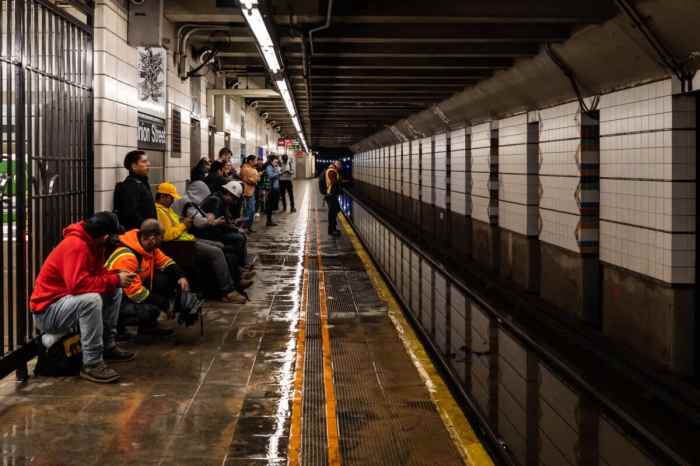On September 13, Brooklyn Democratic City Councilman Charles Barron, who has already declared his candidacy for mayor of the City of New York, appeared as the special guest of the Out People of Color Political Action Club (Out POC PAC), a New York City political club of lesbian, gay, bisexual and transgendered (LGBT) people of color.
Barron recounted how since his election to the New York City Council in 2001, he has voted affirmatively on every piece of pro-gay legislation that has come before the City Council.
On the other hand, Barron acknowledged that he does not support same-sex marriage.
Same-sex marriage, admittedly, is an issue that will likely be resolved for New York City residents at the state level in Albany or in the state’s courts. Nevertheless, three resolutions in support of same-sex marriage have been introduced before the New York City Council, one of which calls upon the mayor and city clerk to begin issuing marriage licenses to committed same-sex couples.
Clearly, the position of the mayor, and mayoral candidates, on the issue of same-sex marriage has significance, both in the future debate statewide and in the politics of next year’s contest between incumbent Michael Bloomberg and his Democratic opponent.
Barron explained that he does not support same-sex marriage because he views marriage as a union between a man and a woman; endorsing marriage for gay and lesbian couples would conflict with his core cultural and religious values.
Not surprisingly, many in the Out POC PAC audience firmly disagreed with Barron’s position, and argued the political and cultural inequities that result from the failure to recognize same-sex marriage.
I, too, disagree with Barron’s position on same-sex marriage. But I believe that a larger question is at stake. As individuals, should we vote for candidates who do not support certain flagpole issues important to us, but who may warrant our endorsement due to other considerations?
It appears that a good number of us intend to do just that. Witness the historic “Kick Off Pride: Kick Out Bush” fund-raiser held this June, in which all of the New York City-based Democratic LGBT political clubs co-sponsored an event to raise money for John Kerry’s presidential bid, despite the fact that the Democratic nominee does not support same-sex marriage.
Ironically, in contrast, there are high-profile LGBT groups for whom the issue of same-sex marriage has been determinative. Consider the national board of the Log Cabin Republicans, which declared war on their beloved president, recently announcing that they do not endorse George W. Bush for re-election, in light of his support of an amendment to the U.S. Constitution that would ban same-sex marriage.
A second question was also put in vivid, even volatile relief by Barron’s appearance at the meeting on September 13. Can we support candidates who embrace those who are perceived as enemies of our communities?
In September 2002, at City Hall, Barron hosted a reception for Pres. Robert Mugabe, the head of state of the African country of Zimbabwe. Around the time of Barron’s visit, Mugabe was under intense international media scrutiny because of his controversial land redistribution policy, which seeks to take back African land from white owners and return it to black Zimbabwean farmers.
But for many LGBT New Yorkers, Mugabe’s visit to City Hall was upsetting because the president has a striking record of overt homophobia toward LGBT Zimbabweans. Mugabe has repeatedly said that he is morally repulsed by homosexuality, once claiming that LGBT people are “worse than pigs and dogs,” and has condoned, and even encouraged, targeted acts of violence toward Zimbabwe’s LGBT people.
Pressed on this matter at the Out POC PAC meeting, Barron stated several times, in unequivocal terms, that he in no way approved of Mugabe’s human rights abuses, and that his public condemnation of Mugabe’s homophobia is a matter of public record. Despite Barron’s comments, many in attendance remained extremely disturbed that Barron would invite Mugabe to City Hall, which brings me back to the two questions I have raised in this piece.
I do not believe in single-issue politics. I can think of no individual with whom I agree totally. I disagree with the decisions of Charles Barron and John Kerry in not supporting same-sex marriage. I agree with Pres. Mugabe’s position on the question of land reform in Zimbabwe, but condemn his human rights abuses against LGBT Zimbabwean citizens.
Notwithstanding, I fully intend to vote for John Kerry in 2004 and Charles Barron in 2005. For me, there are far more pressing considerations that warrant my vote for these two candidates. Barron has stated that, as mayor, some of his key goals would include job creation, development of affordable housing, a crackdown on police brutality; the restoration of free tuition at CUNY schools and the creation of a budget that is not “balanced on the backs of the poor.” Each of these quality of life issues appears higher on my personal list of pressing issues than recognition of same-sex marriage.
What will be the pressing considerations informing your vote?
Angel Moffitt is an attorney currently living in New York City. She is co-president of the Out People of Color Political Action Club; and she is a member of the board of directors of Black Pride NYC, Inc.

































